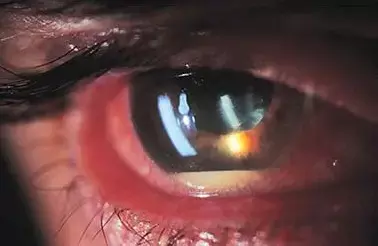- Home
- Medical news & Guidelines
- Anesthesiology
- Cardiology and CTVS
- Critical Care
- Dentistry
- Dermatology
- Diabetes and Endocrinology
- ENT
- Gastroenterology
- Medicine
- Nephrology
- Neurology
- Obstretics-Gynaecology
- Oncology
- Ophthalmology
- Orthopaedics
- Pediatrics-Neonatology
- Psychiatry
- Pulmonology
- Radiology
- Surgery
- Urology
- Laboratory Medicine
- Diet
- Nursing
- Paramedical
- Physiotherapy
- Health news
- Fact Check
- Bone Health Fact Check
- Brain Health Fact Check
- Cancer Related Fact Check
- Child Care Fact Check
- Dental and oral health fact check
- Diabetes and metabolic health fact check
- Diet and Nutrition Fact Check
- Eye and ENT Care Fact Check
- Fitness fact check
- Gut health fact check
- Heart health fact check
- Kidney health fact check
- Medical education fact check
- Men's health fact check
- Respiratory fact check
- Skin and hair care fact check
- Vaccine and Immunization fact check
- Women's health fact check
- AYUSH
- State News
- Andaman and Nicobar Islands
- Andhra Pradesh
- Arunachal Pradesh
- Assam
- Bihar
- Chandigarh
- Chattisgarh
- Dadra and Nagar Haveli
- Daman and Diu
- Delhi
- Goa
- Gujarat
- Haryana
- Himachal Pradesh
- Jammu & Kashmir
- Jharkhand
- Karnataka
- Kerala
- Ladakh
- Lakshadweep
- Madhya Pradesh
- Maharashtra
- Manipur
- Meghalaya
- Mizoram
- Nagaland
- Odisha
- Puducherry
- Punjab
- Rajasthan
- Sikkim
- Tamil Nadu
- Telangana
- Tripura
- Uttar Pradesh
- Uttrakhand
- West Bengal
- Medical Education
- Industry
Immediate Sequential Bilateral surgery effective against Cataract

A new study published in The Lancet showed that immediate sequential bilateral cataract surgery (ISBCS) is non-inferior to delayed sequential bilateral cataract surgery (DSBCS) in terms of efficacy results, equivalent safety, and improved cost-effectiveness.
To ensure future access to cataract treatment in an ageing population, efficiency improvements are essential. By comparing the safety, efficacy, and cost-efficiency of instant sequential bilateral cataract surgery against delayed sequential bilateral cataract surgery, we want to fill information gaps. Lindsay Spekreijse and colleagues hypothesized in this investigation that ISBCS is not inferior to DSBCS in terms of safety and efficacy, and that it is superior in terms of cost-efficiency.
A multicenter, randomized controlled study with patients from eleven Dutch hospitals was carried out. Participants had to be 18 years old or older, have straightforward surgery, and have no higher risk of endophthalmitis or refractive surprise. Using a web-based approach stratified by center and axial length, participants were randomly allocated (1:1) to either the ISBCS (intervention) or DSBCS (traditional method) groups. Because of the nature of the intervention, participants and outcome assessors were not blinded to the treatment groups. The primary outcome was the proportion of second eyes with a goal refractive result of 0 dioptre (D) or below 4 weeks after surgery, with a -5% non-inferiority margin for ISBCS versus DSBCS.
The key findings of this study were:
1. Between September 4, 2018, and July 10, 2020, 865 patients were randomly allocated to either the ISBCS or DSBCS groups.
2. The proportion of second eyes with a goal refraction of 10 D or below was 97% in the ISBCS group vs 98% (407 of 417) in the DSBCS group in the modified intention-to-treat analysis.
3. The percentage difference was -1%, indicating non-inferiority of ISBCS over DSBCS. In neither group were endophthalmitis detected or reported.
4. Adverse occurrences were comparable between groups, with only unsettling anisometropia showing a significant difference. ISBCS had €403 (US$507) lower societal expenses than DSBCS.
5. ISBCS outperformed DSBCS in terms of cost-effectiveness throughout a willingness-to-pay range of €2500-80 000 per quality-adjusted life-year.
Reference:
Spekreijse, L., Simons, R., Winkens, B., van den Biggelaar, F., Dirksen, C., Bartels, M., de Crom, R., Goslings, O., Joosse, M., Kasanardjo, J., Lansink, P., Ponsioen, T., Reus, N., Schouten, J., & Nuijts, R. (2023). Safety, effectiveness, and cost-effectiveness of immediate versus delayed sequential bilateral cataract surgery in the Netherlands (BICAT-NL study): a multicentre, non-inferiority, randomised controlled trial. In The Lancet. Elsevier BV. https://doi.org/10.1016/s0140-6736(23)00525-1
Neuroscience Masters graduate
Jacinthlyn Sylvia, a Neuroscience Master's graduate from Chennai has worked extensively in deciphering the neurobiology of cognition and motor control in aging. She also has spread-out exposure to Neurosurgery from her Bachelor’s. She is currently involved in active Neuro-Oncology research. She is an upcoming neuroscientist with a fiery passion for writing. Her news cover at Medical Dialogues feature recent discoveries and updates from the healthcare and biomedical research fields. She can be reached at editorial@medicaldialogues.in
Dr Kamal Kant Kohli-MBBS, DTCD- a chest specialist with more than 30 years of practice and a flair for writing clinical articles, Dr Kamal Kant Kohli joined Medical Dialogues as a Chief Editor of Medical News. Besides writing articles, as an editor, he proofreads and verifies all the medical content published on Medical Dialogues including those coming from journals, studies,medical conferences,guidelines etc. Email: drkohli@medicaldialogues.in. Contact no. 011-43720751


